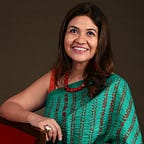#DemocracyOf Stories Edition 1
What is history?
One Sunday morning I found myself gripped by the writing of two young women who have begun The Parallel Campaign. Through their fortnightly writing, they attempt to “question the dominant historical narratives taught in our schools and favoured by political elites and share themes and perspectives that may not be easily found in more established media. History matters (and it can be fascinating)!” Their first issue which coincided with India’s 74th Independence Day and looks at “why history is critical to nationalism, and why mainstream Indian history is a bit like your drunk uncle!”
A few years ago, my son wrote a College Admission essay to a prompt: This is what history consists of. It’s the sum-total of all the things they aren’t telling us — Don DeLillo, Libra. What is history, who are “they,” and what aren’t they telling us? In the essay, he quoted Julian Barnes, one of my favourite writers, from his book “Sense of an Ending” : “History is that certainty produced at the point where the imperfections of memory meet the inadequacies of documentation”. My son went on to write in the essay: The quote goes to highlight the many limitations that exist — both human and technological — in the recording of history. Since history is written by humans, who are susceptible to error in the form of personal biases, misinformation, barriers to reporting, and lack of opportunity — it is highly opinion-based and immensely subjective. Science based-disciplines like mathematics tend toward ‘black’ and ‘white’; much of history is ‘grey’.
Today, we have many different stories that claim the pre-eminence of some political figure or the other and the role these figures played in the Independence Movement. The spotlight keeps moving from the legacy of Mahatma Gandhi to that of Jawaharlal Nehru or Vallabhbhai Patel or Veer Savarkar or Lokmanya Tilak. But the approach of singular credit for The Freedom Project that spanned many decades takes away from the pluralism of stories that if heard, will inspire and ignite many young minds rather than create a world where one category of people is routinely believed and one category routinely disbelieved! And so, I leave you with this excerpt from a speech that Maulana Abul Kalam Azad delivered as his Congress Presidential Address in 1940.
“It was India’s historic destiny that many human races and cultures should flow to her, finding a home in her hospitable soil, and many a caravan should find rest here …… Eleven hundred years of common history [of Islam and Hinduism] have enriched India with our common achievements. Our languages, our poetry, our literature, our culture, our art, our dress, our manners and customs, the innumerable happenings of our daily life, everything bears the stamp of our joint endeavor…These thousand years of our joint life [have] moulded us into a common nationality …… whether we like it or not, we have now become an Indian nation, united and indivisible. No fantasy or artificial scheming to separate and divide can break this unity.
Read the full story here: India, but of whose imagination?
Originally published at https://www.linkedin.com.
